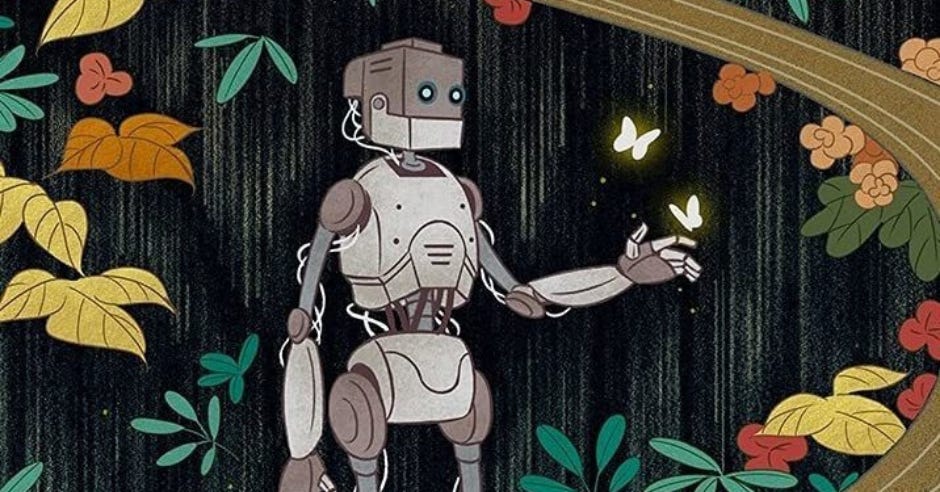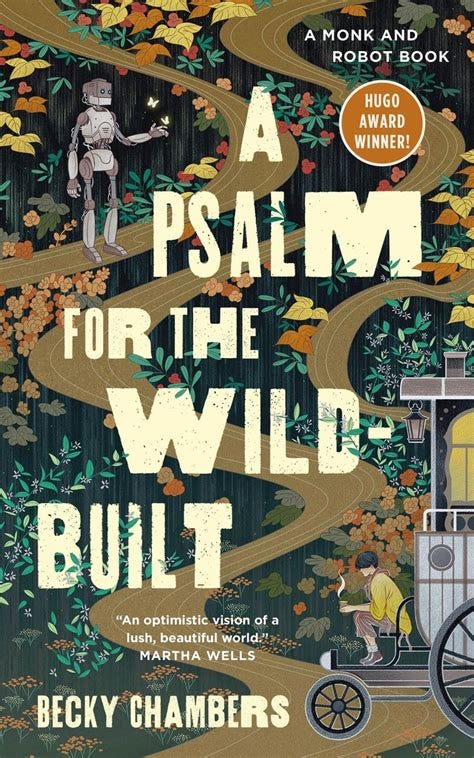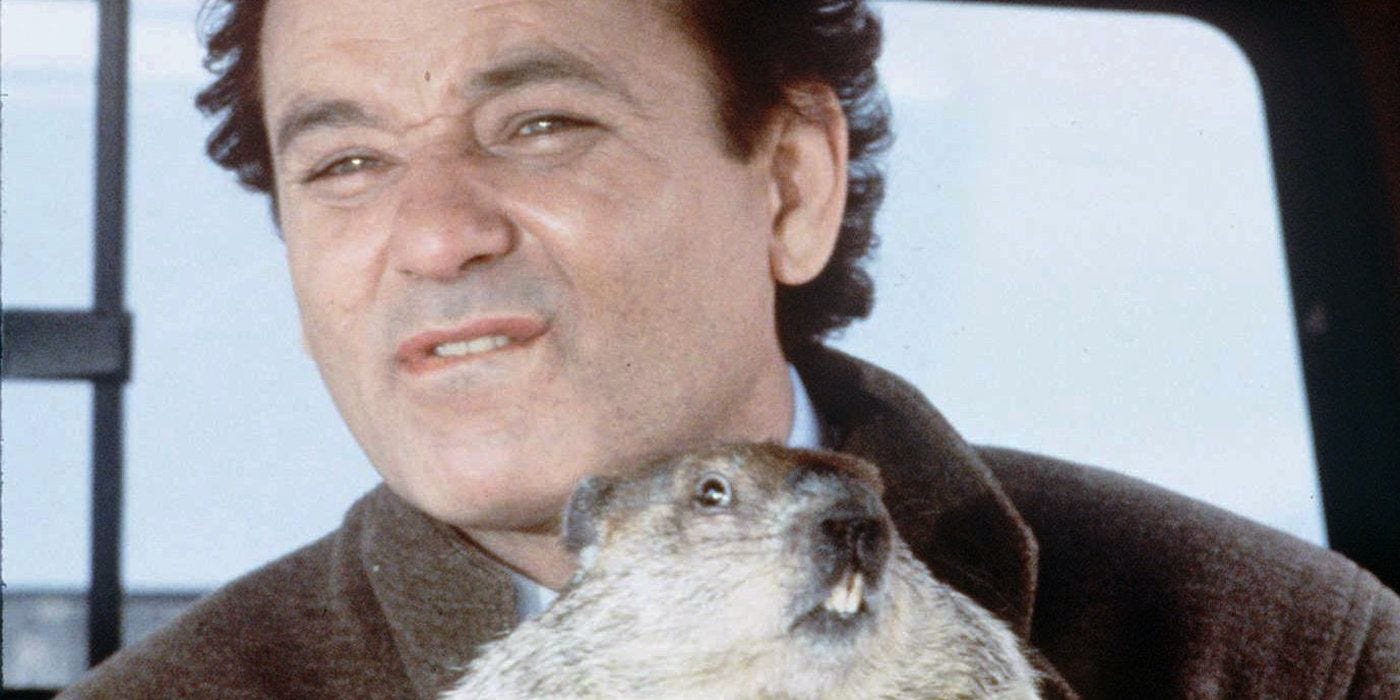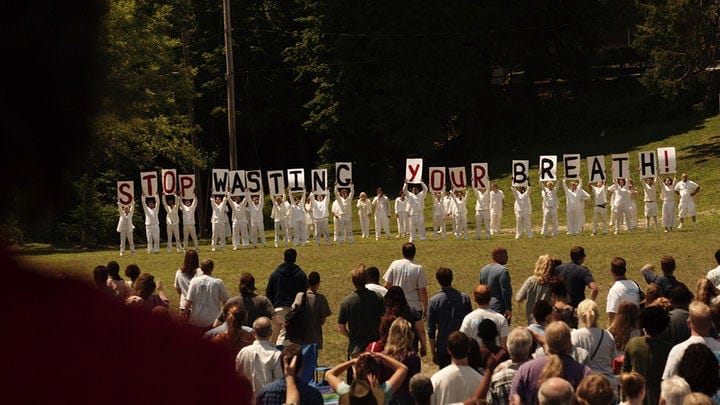* This text may contain spoilers for the book A Psalm for the Wild-Built
There's only one certainty in life: we will die. That notion causes most people anxiety. As little monkeys who know that one day we won't be here anymore, we find it difficult to comprehend what it all means. Why are we here? What is our life for?
There is nothing we struggle with more than the notion that everything we go through might not have a reason.
To counteract that, our western dominated society says we should search and give purpose to our lives, ourselves1. If you can find meaning through work, that's a double win. After all, you are more productive that way.
In one of my favorite texts, "Don't Obsess over a True Calling", I explored extensively how our obsession with following a vocation leads to problems.
Don't obsess over a true calling
When my partner was 8 and asked what he wanted to be as a grown-up, he wishfully answered "Red Power Ranger". Meanwhile, across the Atlantic, I already knew at the same young age what I would spend the next 20 years striving to be: "a marine biologist".
I wanted to expand on it. Because the problem is not only that we are interested in multiple things, but it's more fundamental than that. We want to give our lives meaning. So, we keep looking relentlessly for something that will give our existence a reason. Maybe it is having children? What about writing a book? Maybe living completely off-grid? What if it's working for a charitable cause? Or becoming a politician? (I could go on and on).
The problem is that we are never quite satisfied with whatever we choose as the solution to this dilemma because it is impossible to know the meaning of our lives. Even if we lived a flawless life that can only rival Jesus', we still wouldn't know if that was our purpose all along. There is no one to tell you so, right? No angels to give you a thumbs-up.
A Psalm for the wild-built
In this short book, author Becky Chambers explores a utopian future scenario that fits into the genre often called Solar Punk. Solar Punk is an artistic movement inspired by steam punk. It imagines a world where we live in harmony with nature while using green and futuristic technologies.
But even in a utopian future, life is still not perfect in this world, because otherwise there's no conflict and no book. The main character Dex feels unfulfilled. They continue to search for places and activities that will give their life meaning. First they become a monk, then they decide to be a tea-maker monk — which travels from city to city offering tea and an open ear to people wanting some time to relax and someone to talk to. Finally, they get into their head that they need to journey to a forgotten temple in the middle of the forest to find their way in life.
They are helped to the temple by a robot who lives in the forest, named Splending Speckled Mosscap. Robots in this world have gained conscience, stopped working and left the human world to live hidden in the forest.
Even in an "ideal" world where we don't have to worry about having a good enough life, where nature is preserved, there's no poverty, etc, humans still struggle with their own mortality. Their need for meaning in life follows.
The book answers by finding solace in nature and animals. We are animals even if we like to think we aren't. What is the meaning of a bird, a fish, a cat or a tree? You can say that biologically they fulfill an ecological role and if you like Darwin, they exist to reproduce and multiply. But that doesn't really answer the question, does it? Is their purpose in life to fulfill an ecological role? And if so, doesn't that just mean that their purpose is merely to exist? Just follow their instincts and be themselves?
The search for meaning causes distress
I would say that the need to prove to us and others that our life is meaningful is the seed of a lot of wrongdoing in the world. Dictators want to show the world that they have achieved power and that their lives are significant. So do billionaires and people obsessed with fame and power. They will go to great lengths to show how significant their lives were, usually leaving a trail of destruction behind.
Even people who wish to find meaning in helping others and the world can experience heartbreak, toxic working environments, disillusionment, and a constant feeling of lacking from it.
It's very harsh to think that we will live a meaningless life. Culturally, we feel appalled by this prospect. But if you think about the people in your life that you have loved and who have died, did their lives have a clear meaning? Did they accomplish anything remarkable? If so, is that the meaning of their lives? Or did we just love them for being exactly how they were? A fellow human journeying through life, with all its ups and downs, learning and loving as they go.
We certainly need people who act and do the right thing, but maybe it's wise to question why we do so much? Are we trying to justify our existence for ourselves and others?
I believe it's possible to accept that we don't know the meaning of our lives and just be. Stop looking for your purpose, your call, your reason to be. That doesn't mean we won't do anything and stay in bed rotting. Animals and plants are active, right?
The problem is forcing your way there. It is the constant feeling of not being there yet. It's doing something that doesn't feel right to us while we think it is our calling. Ultimately, we know when something isn't right, as well as when we enjoy something and know it's something we should be doing. We feel it in our bodies. We know it's the right thing to do. It's just our nature. Like a cat acts as a cat, we are just being ourselves and that's the beauty of it.
We have to listen more to our own gut and intuition and not to others' or societies' expectations of what a good enough person should look like. Just do what feels right for you.2.
A Psalm for the Wild-Built by Becky Chambers
In this novel, Sibling Dex, a monk of the God of Comfort leaves their comfortable post as a garden monk in the city to become a traveling tea monk, bringing comfort and solace to those who need it. Dex feels restless and yearns for adventure, leading him to journey into the wilderness to meet the robot Splending Speckled Mosscap. An unlikely friendship develops between the two as they navigate ideas of civilization versus wilderness, the importance of restraint, and the purpose of life. Ultimately, Mosscap helps their new friend find his direction.
My only problem with this book is that it's very short (147 pages). It feels more like the beginning of a book, than an entire complete book. There is a second book, which I haven't read, so maybe more people felt the same way about it.
Groundhog Day (1993)
Stuck in a small town and destined to relive the same day over and over again, weather man Phil is forced to change his behavior towards life and others. He moves through different phases when he learns that he is stuck on the same day, no matter what he had done the day before. From shock to euphoria and depression. He finally learns to make the best of it by seeing the positives in his situation and being present in his newfound life. This movie is a classic and even though it's over 30 years old, it still brings relevant and timeless topics for discussion.
The Leftovers (HBO)
No other show I could think of illustrates the search for meaning better than The Leftovers. The series' hook is as follows: what if, in the blink of an eye, 2% of the world’s population vanished? No warning, no nothing. It’s that premise that kicks off the pilot, the “sudden departure” of children, brothers, lovers, and friends. Three years after the “event”, people are trying to grieve while the possibility of their return lurks in the background. There are those who want to move on, those who don’t know how to let go, and those inspired to completely upend their lives for better or worse.
People try to deal with the disappearance in different ways. Some ignore it, some try to find scientific explanations, others turn to new religions, some grieve, while others resort to chaos. It's a perfect allegory for our difficulties when facing death.
Especially since the rise of scientific thought and Nietzsche declaring 'God is dead'.
I know it's much easier said than done. Whatever I write about is something I'm also struggling with. And I know humans are far more complex than plants and animals, but I believe that the more we are true to ourselves the better we will live.












I loved A Psalm for the Wild-built so much. I've never heard of solar punk, but I love it! I love the version of the future described in these books (I think I've read all of them...there might be three?). But, yes, also, even when we have a lot of things figured out, it doesn't mean people don't get restless and unhappy and embark on a search for meaning.
I think we look for meaning because we are meaning-making creatures. That's what our brains do, try to construct narrative. I think it's one of the things that makes us human, our desire for meaning. It doesn't always mean it's a good thing, though. I think we'd certainly be more content if we just settled for the idea that existing is meaning enough. It's enough just to be here. Also maybe to not be a total dick.
Beautifully put. I think we do try to justify our existence and the cost can be truly hoorific. Listening to our gut and intuition is by far better.